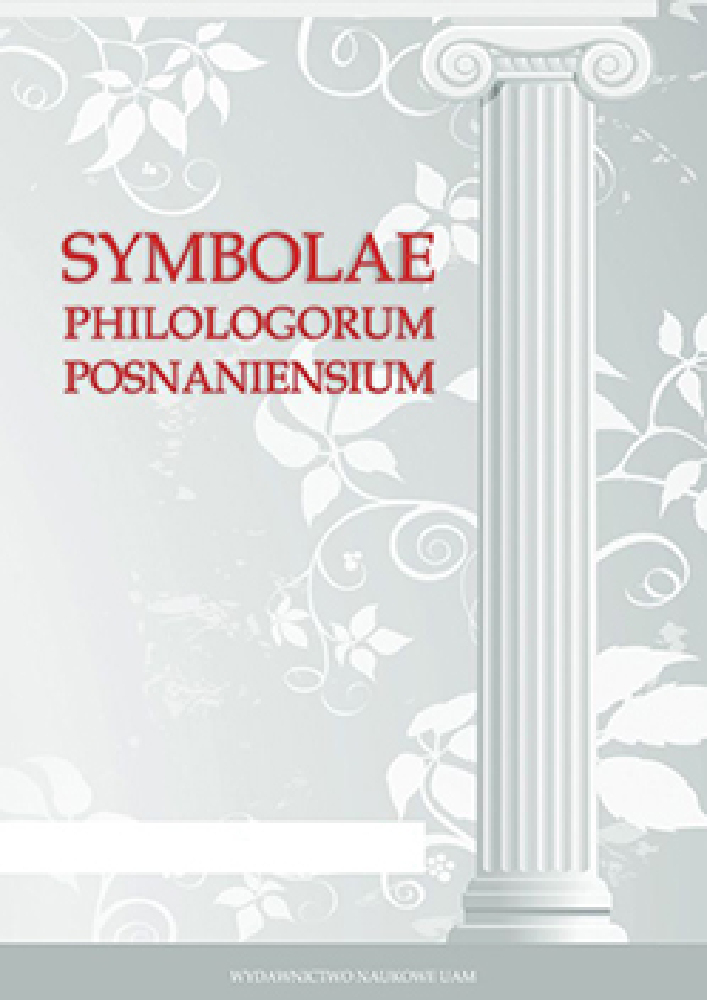Abstrakt
The purpose of this paper is to show how Middle and New comedy as well as gastronomic poetry authors use the protos heuretes-motif characteristic of literature undertaking heurematographic themes, to present the originality and innovation of the cook’s and parasite’s art.
Bibliografia
Arnott 1996: Arnott, W. G. 1996. Alexis: The Fragments. A Commentary. Cambridge: Cambridge University Press.
Bartol 1996: Bartol, K. 1996. “Smakować poezję. ‘Gastronomia literacka’ w wypowiedziach greckich poetów lirycznych.” In Litteris vivere. Księga pamiątkowa ofiarowana Profesorowi Andrzejowi Wójcikowi. Ed. I. Lewandowski and K. Liman. Poznań: Wydawnictwo Naukowe UAM, 31–41.
Bartol 2005: Bartol, K. 2005. “Autoprezentacje pasożytów w cytowanych przez Atenajosa urywkach greckiej komedii średniej i nowej.” Meander 60 (1): 27–35.
Bartol 2006: Bartol, K. 2006. “The Lost World of Inventors: Athenaeus’ Sentimental Heurematography.” Palamedes 1: 85–96.
Bartol, Danielewicz 2011: Bartol, K., and J. Danielewicz. 2011. Komedia grecka od Epicharma do Menandra. Warszawa: Wydawnictwo Naukowe PWN.
Baumbach 2008: Baumbach, M. 2008. “Protos Heuretes.” In Brill’s New Pauly. Vol. 12. Ed. H. Cancik and H. Schneider, transl. by C. F. Salazar and F.G. Gentry. Leiden-Boston: Brill, 73–74.
Dalby 2003: Dalby, A. 2003. Food in the Ancient World from A to Z. London–New York: Routledge.
D’Angour 2011: D’Angour, A. 2011. The Greeks and the New: Novelty in Ancient Greek Imagination and Experience. Cambridge: Cambridge University Press.
Diels, Kranz 1951–1952: Diels, H., and W. Kranz. 1951–1952. Die Fragmente der Vorsokratiker, griechisch und deutsch. Bd. I–III. Berlin: Weidmann.
Dohm 1964: Dohm, H. 1964. Mageiros. Die Rolle des Kochs in der griechisch-römischen Komödie. München: C.H. Beck.
Gulick 1927–1941: Gulick, Ch. B. 1927–1941. Athenaeus. The Deipnosophists with an English translation. Vol. I-VII. London-New York: Harvard University Press.
Hunter 1983: Hunter, R. L. 1983. Eubulus. The Fragments. Cambridge: Cambridge University Press.
Kassel, Austin 1983–2001: Kassel, R., and C. Austin. 1983–2001. Poetae Comici Graeci. Vol. I-VIII. Berolini-Novi Eboraci: De Gruyter.
Kleingünther 1933: Kleingünther, G. 1933. PRWTOS EURETHS. Untersuchungen zur Geschichte einer Fragestellung (Philologus Suppl. 26). Berlin: Arno Press.
LSJ 1996: A Greek-English Lexicon. 1996. Compiled by H. G. Lidell and R. Scott, revised and augmented throughout by Sir H.S. Jones. Oxford: Clarendon Press.
Nesselrath 1990: Nesselrath, H.-G. 1990. Die Attische Mittlere Komödie. Ihre Stellung in der antiken Literaturkritik und Literaturgeschichte. Berlin-New York: De Gruyter.
Olson 2006–2012: Olson, S. D. 2006–2012. Athenaeus. The Learned Banqueters. Ed., transl. by S.D. Olson, Cambridge (Mass.)–London: Harvard University Press.
Olson 2007: Olson, S.D. 2007: Broken Laughter. Select Fragments of Greek Comedy. Oxford University Press.
Olson, Sens 1999: Olson, S. D., and A. Sens. 1999. Matro of Pitane and the Tradition of Epic Parody in the Fourth Century BCE. Text, translation and commentary. Atlanta-Georgia: Scholars Press.
Olson, Sens 2000: Olson, S. D., and A. Sens. 2000. Archestratos of Gela. Greek Culture and Cuisine in the Fourth Century BCE. Text, translation and commentary. Oxford: Oxford University Press.
Page 1962: Page, D. L. 1962. Poetae Melici Graeci. Oxford: Clarendon Press.
Pellegrino 1988: Pelegrino, M. 1988. In Tessere. Frammenti della commedia greca: studi e commenti. Ed. by A.M. Belardinelli, O. Imperio, G. Mastromarco, M. Pellegrino, and P. Totaro, 291–339. Bari: Adriatica.
Rosenbloom 2014: Rosenbloom, D. 2014. “The Politics of Comic Athens.” In The Oxford Handbook of Greek and Roman Comedy. Ed.by M. Fontaine and A.C. Scafuro, 297–320. Oxford: Oxford University Press.
Schnayder 1949: Schnayder, J. 1949. “Wynalazca jako problem literatury greckiej.” Meander 4: 114–122.
Stuligrosz 2012: Stuligrosz, M. 2012. “Uczta” Filoksenosa na tle tradycji greckiej poezji gastronomicznej. Poznań: Wydawnictwo Naukowe UAM.
Stuligrosz 2015: Stuligrosz, M. 2015. “MAGEIROS SOFISTHS. The Learned Cook in Athenaeus’ Deipnosophistai.” Classica Cracoviensia 18: 363–376.
Stuligrosz 2021: Stuligrosz, M. 2021. “Wszystko jest dziełem wynalazcy. Motyw protos heuretes w greckiej poezji archaicznej i klasycznej.” Meander 76 (in print).
Thraede 1962: Thraede, K. 1962. “Das Lob des Erfinders. Bemerkungen zur Analyse der Heuremata-Kataloge.” Rheinisches Museum für Philologie 105: 158–186.
Thraede 1962a: Thraede, K. 1962a. “Erfinder II.” RAC 5: 1191–1278.
Wilkins 2000: Wilkins, J. 2000: The Boastful Chef. The Discourse of Food in Ancient Greek Comedy. Oxford: Oxford University Press.
Wilkins, Hill 2006: Wilkins, J. M., and S. Hill. 2006. Food in the Ancient World. Malden (Mass.)–Oxford: Blackwell Publishing.
Witty 2017: Witty, M. 2017: “Athenaeus describes the most ancient intellectual property.” Prometheus 35 (2): 137–143.
Licencja
Prawa autorskie (c) 2021 Magdalena Stuligrosz

Utwór dostępny jest na licencji Creative Commons Uznanie autorstwa 4.0 Międzynarodowe.

